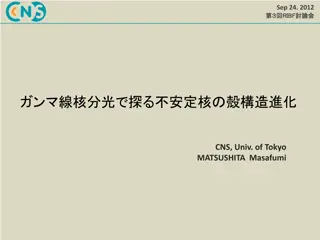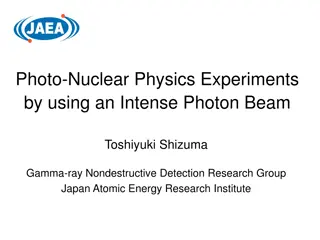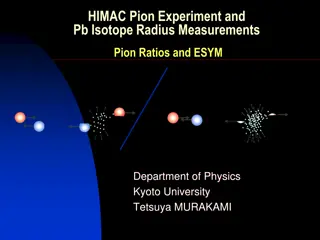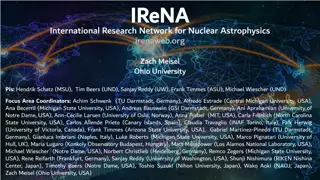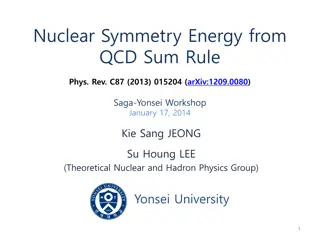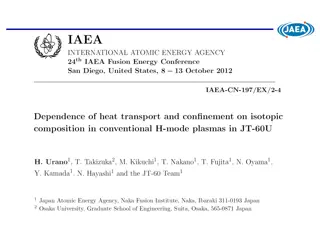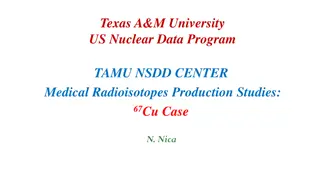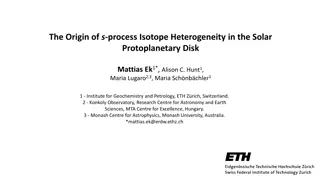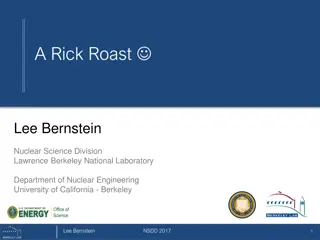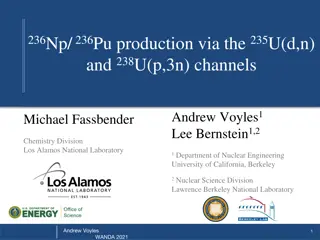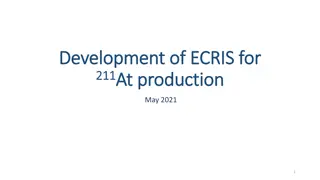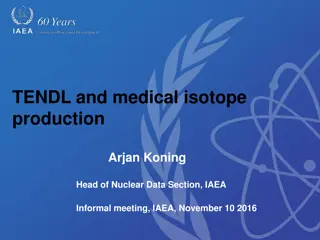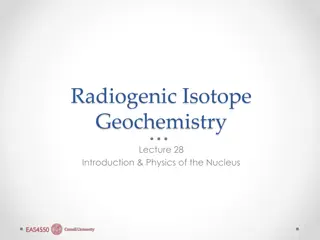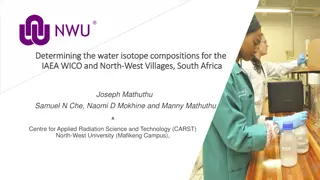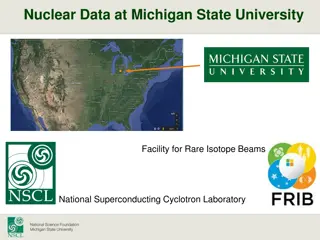Fission Near 198Pb with AT-TPC at FRIB: Insights from Curtis Hunt
Delve into the intriguing world of fission studies near 198Pb using the AT-TPC at FRIB. Supported by the DOE Office of Science, this research probes nuclear structure, fission properties, and fusion-fission reactions. By employing innovative techniques like the Heavy Isotope Tagger and active target
4 views • 39 slides
Overview of Particle Accelerators and Isotope Production Methods
Explore various types of particle accelerators such as Direct Voltage Accelerators, Van de Graaff Generators, Tandem Van de Graaff Accelerators, and Linear Accelerators used in generating particles for isotope production, research, and industrial applications. These technologies play a crucial role
6 views • 22 slides
Rare Isotope Beams from FRIB - Facility Overview and Operations
FRIB (Facility for Rare Isotope Beams) is supported by the U.S. Department of Energy and Michigan State University. It utilizes advanced techniques for rare isotope beam formation, offering insights into nuclear physics. The facility operates with high beam power, serving various scientific experime
1 views • 15 slides
Advances in Nuclear Physics Research at RIKEN's RIBF Facility
Cutting-edge research at RIKEN's Radioactive Isotope Beam Factory (RIBF) in collaboration with the University of Tokyo, focusing on gamma-ray spectroscopy setups, in-beam experiments, and detector arrays like DALI2. The experiments involve studying reaction channels, Doppler shift effects, and explo
10 views • 20 slides
Advanced Photon-Beam Experiments in Nuclear Physics Research
Explore cutting-edge experiments in nuclear physics using intense photon beams, nondestructive isotope detection, laser Compton scattering rays, and photon beams for fundamental collective motion studies. Learn about nuclear resonance fluorescence, dipole excitation strength distribution, and detail
0 views • 12 slides
Nuclear Physics Research Highlights: Neutron Stars, Nuclear EOS, and Pb Isotope Studies
Explore cutting-edge research in nuclear physics, including experiments on pion ratios and Pb isotope radius measurements, neutron star observations, neutron density distributions of Pb isotopes, and polarized proton beams at Osaka University. Learn about the analysis of realistic point proton densi
0 views • 26 slides
IReNA: International Research Network for Nuclear Astrophysics
IReNA is an international network of networks focused on nuclear astrophysics, connecting researchers from various countries and institutions to enhance collaboration. Networks include Rare Isotope Accelerators, Gravitational Waves, Neutrino Physics, and more, aiming to advance research in the field
0 views • 11 slides
Magnetic Field Suppression and Cavity Frequency Control in SRF Development at FRIB
This material discusses the techniques used at the Facility for Rare Isotope Beams (FRIB) to suppress magnetic fields and control cavity frequencies. It covers topics such as remnant field suppression, solenoid package design, validation tests, and magnetic shield material validation for the FRIB cr
4 views • 14 slides
Nuclear Symmetry Energy with QCD Sum Rule
This study delves into the concept of nuclear symmetry energy through the lens of QCD Sum Rule, discussing its implications in Rare Isotope Accelerator Plan and nucleon-nucleus scattering. Utilizing mean field approximation and Borel transformation, the research aims to understand asymmetric nuclear
2 views • 21 slides
Hydrogen Isotope Influence on H-Mode Confinement in Fusion Plasmas
Knowledge of how the hydrogen isotope impacts H-mode confinement is crucial for predicting energy confinement in future fusion plasmas. Research explores the relationship between isotope mass and confinement time, highlighting the optimistic outlook for future reactors. Experimental studies on hydro
0 views • 13 slides
Advancements in Rare Isotope Research at EURISOL Town Meeting
Cutting-edge research and facility developments in the field of rare isotopes were showcased at the EURISOL Town Meeting in INFN - Pisa. Topics included advances in EBIS charge breeders, the ARIEL Extension facility, and the CANREB laboratory with Electron Beam Ion Source technology. Various aspects
1 views • 39 slides
Copper-67 as a Medical Isotope: Potential and Production Methods
Copper-67 (Cu-67) is a promising medical isotope due to its biological compatibility, short half-life, and dual treatment and imaging capabilities. This isotope offers non-toxicity, desired decay modes, and suitable half-life for medical applications. Various production methods, such as rare isotope
1 views • 7 slides
Advances in Medical Radioisotope Production: Focus on 67Cu at Texas A&M University
Texas A&M University's Nuclear Data Program is at the forefront of research on medical radioisotopes, particularly highlighting the production and potential applications of 67Cu. This isotope offers promising benefits for diagnostic imaging and radioimmunotherapy due to its low-range, highly ionizin
3 views • 12 slides
Mass Spectrometry Principles and Applications
Mass spectrometry is a powerful analytical technique used to determine the molecular mass, formula, and structural features of compounds. By ionizing molecules in a mass spectrometer, it generates molecular ions that reveal valuable information about the composition of the compound. Isotope peaks he
2 views • 33 slides
Isotope Heterogeneity in Solar Protoplanetary Disk
Explore the origin of s-process isotope heterogeneity in the solar protoplanetary disk, delving into cosmochemistry, isotopic variations in meteorites, and the significance of internal normalization. Discover the correlation between Pd isotope compositions in iron meteorites and the solar system s-p
2 views • 17 slides
The Remarkable Career of Rick Roast - A Nuclear Science Journey
Rick Roast, a prominent figure in nuclear data, has made significant contributions in the field through initiatives like Isotope Explorer and EGAF. Even after retirement, he continues to lead important projects in nuclear research. His work bridges the gap between nuclear structure and reactions, re
1 views • 8 slides
Importance of Optimizing Nuclear Data for Isotope Production in Reactors
Optimizing nuclear data is crucial for enhancing isotope production efficiency in reactors. Improved cross section data can lead to cost reductions and material savings by enabling better production optimization. Specific cross sections are required for heavy isotope production, as well as for medic
2 views • 15 slides
Production and Analysis of Neptunium Isotopes via Nuclear Reactions
Neptunium-236 and its production via nuclear reactions using uranium-235 and uranium-238 channels are explored. The utilization of Neptunium-236 as a tracer for Isotope Dilution Mass Spectrometry to determine Neptunium-237 is discussed along with research initiatives and challenges in Neptunium prod
5 views • 7 slides
Development of ECRIS for 211At Production at BNL
To modernize BNL's medical isotope production capability, this project focuses on developing an Electron Cyclotron Resonance Ion Source (ECRIS) for the production of Li3+ and He2+. The aim is to facilitate the production of 211At through innovative approaches, such as the 209Bi(7Li, 5n)211Rn method.
3 views • 5 slides
Isotope Production Technique by Muon Beam from Pion Capture Solenoid System
Isotope production technique using muon beam from pion capture solenoid system at JPARC, focusing on data analysis of targets like 93Nb, 100Mo, and 181Ta over three experimental days. Explore the relevance of energy peaks to potential isotopes, with reference to nuclear data sheets for Ta-181 decay.
1 views • 37 slides
TENDL and medical isotope production
TENDL and its critical role in medical isotope production. Learn about nuclear data, uncertainty propagation, reaction pathways, and software tools like ISOTOPIA for optimizing irradiation outcomes
0 views • 17 slides
Radiogenic Isotope Geochemistry in Nucleus Physics
Radiogenic isotope geochemistry delves into the origins of the Earth's antiquity through radioactive decay and nuclear structure exploration. This lecture introduces key concepts in nuclear physics, such as isotopes, binding energy, and nuclear forces, essential for understanding the behavior of sta
4 views • 28 slides
Water Isotope Compositions in North-West Villages, South Africa
Water stable isotopes (18O and 2H) play a crucial role in understanding meteorological processes. This study aims to determine water isotope compositions in IAEA WICO and North-West villages of South Africa. Specific objectives include evaluating the Global and Local Meteoric Water Lines, analyzing
1 views • 19 slides
Novel Isotope Production Using the TR19 Cyclotron
This research project focuses on establishing routine production of theragnostics using the TR19 cyclotron, developing solid targetry for radiometals, and performing FLUKA analysis to inform targetry. The approach involves establishing a solid target system, developing methods for producing Radium t
3 views • 7 slides
Water Isotope System for Precipitation Research
Focused on measuring water vapor isotopologues in clouds, the WISPER system uses sophisticated instrumentation to study cloud microphysics and precipitation processes. Despite challenges like condensation and icing, the system provides valuable insights into cloud composition and dynamics. The limit
2 views • 32 slides
Water Isotope System for Cloud Research
Water Isotope System for Precipitation and Entrainment Research (WISPER) utilizes advanced spectrometers to measure water vapor and isotopologues in clouds. The system helps in understanding cloud microphysics, droplet formation, and vapor transfer processes. However, it faces challenges such as con
2 views • 16 slides
Advancing Isotope Production at BNL
Researchers at Brookhaven National Laboratory are working on upgrades for isotope production to meet current and future needs, including developing new processing capabilities and particle beams. The project aims to address gaps in accelerator production and infrastructure to support US radioisotope
4 views • 8 slides
Nuclear Data at Michigan State University Facility for Rare Isotope Beams
The Michigan State University Facility for Rare Isotope Beams (FRIB) is dedicated to advancing nuclear science by studying rare isotopes. The facility houses the National Superconducting Cyclotron Laboratory, which enables cutting-edge research in nuclear physics and related fields. Researchers at F
3 views • 15 slides
Nuclear Data at MSU Facility for Rare Isotope Beams
Michigan State University's National Superconducting Cyclotron Laboratory houses the Facility for Rare Isotope Beams, conducting experiments with over 1000 Radioactive Ion Beams. The project started in 2009, with reaccelerated beams reaching up to 12 MeV/u. Transitioning from NSCL to FRIB, the facil
1 views • 13 slides
Implications of TFTR D-T Experiments for ITER
D-T experiments differ from D due to isotope effects, transport mechanisms, wave-particle interactions, and alpha-particle physics. Changes in ion thermal conductivity, isotope effects on confinement, and isotope scaling variations in different operating regimes are discussed. The impact of neutral
3 views • 22 slides
Isotope Effects in Thermal Neutron Scattering
This research discusses isotope effects in thermal neutron scattering, presented at the ORNL Cross Section Evaluation Working Group Meeting in November 2021. The study explores the impact of different isotopes on neutron scattering behavior, shedding light on valuable insights for neutron scattering
0 views • 10 slides
Effects of Ocean Acidification on Large Benthic Foraminiferal Stable Isotope Composition
This research article explores the impact of ocean acidification on the stable isotope composition of large benthic foraminifera. The study investigates calcite saturation state under different pH and CO32- conditions, emphasizing the effects on Miliolid and Rotalid foraminifera. Results show signif
1 views • 12 slides
Earth's Atmospheric Chemistry, Formation, and Evolution
Explore the fascinating journey of Earth's atmosphere, from its formation and the origins of life to the impact of atmospheric chemistry on our planet. Learn about the early atmosphere, thermal consequences, mantle formation, isotope distribution, and the appearance of the atmosphere through isotope
1 views • 69 slides
Abigail McGlone - IOP Nuclear Physics Conference Highlights
Abigail McGlone presented at the IOP Nuclear Physics Conference on topics like Collinear Resonance Ionization Spectroscopy of Antimony and Experimental Achievements in Molecular Spectroscopy. The presentations covered techniques, theoretical insights, and experimental details in the field of nuclear
0 views • 22 slides
Understanding Radiogenic Isotope Geochemistry and Decay Series in Geology
Explore the concepts of radiogenic isotope geochemistry, U and Th decay series isotopes, radioactive equilibrium, dating methods like 234U-238U and 230Th-234U, and more in geology for geochronology and oceanography applications.
3 views • 21 slides
Isotope Harvesting Program at FRIB: Innovation and Research Advancements
Discover the groundbreaking Isotope Harvesting Program at FRIB, developed by Michigan State University in collaboration with the U.S. Department of Energy. Explore rare isotope production, linear heavy ion acceleration, and unique infrastructure for harvesting valuable isotopes. Dive into the cuttin
4 views • 17 slides
Exploring Biomedical Radiotracer Diffusion in Target Chamber
Investigate the diffusion and effusion processes of biomedical radiotracers in the SPES-ISOLPHARM target chamber through simulations and theoretical studies. Explore isotope generation, release, and production in SiC targets with computational modeling. Analyze parameters affecting atom release time
0 views • 4 slides
Radiogenic Isotope Geochemistry III: Lu-Hf and Re-Os Systems Overview
Explore the Lu-Hf and Re-Os systems in radiogenic isotope geochemistry, detailing decay processes, elements involved, isotopic ratios, analytical challenges, and their significance in dating rocks and understanding Earth's formation. Discover the complexities and insights gained from studying these
2 views • 31 slides
Cutting-Edge Medical Isotope Production Research at Texas A&M University
Explore the forefront of medical isotope production research at Texas A&M University, focusing on the innovative methods and technologies used to enhance the availability of crucial medical radioisotopes like 67Cu. Discover how these advancements are revolutionizing nuclear medicine and improving di
3 views • 12 slides
Understanding Stable Isotope Geochemistry II
Explore the concepts of mass-dependent and mass-independent fractionation in stable isotope geochemistry, including isotopic composition predictions and examples. Learn about isotope geothermometry and isotope clumping in this detailed lecture.
3 views • 22 slides



